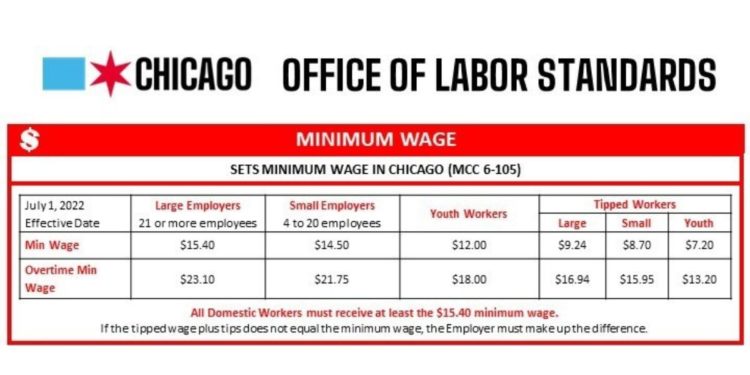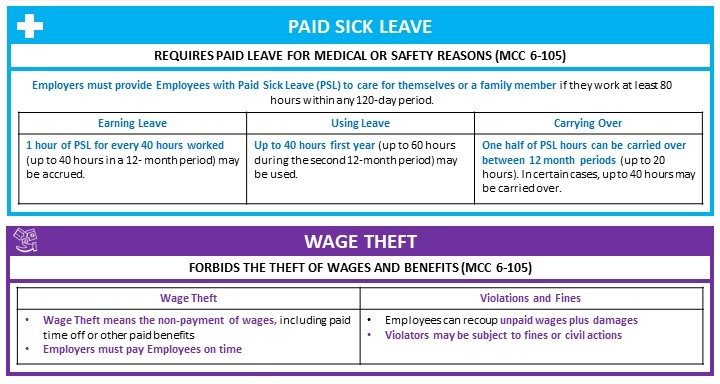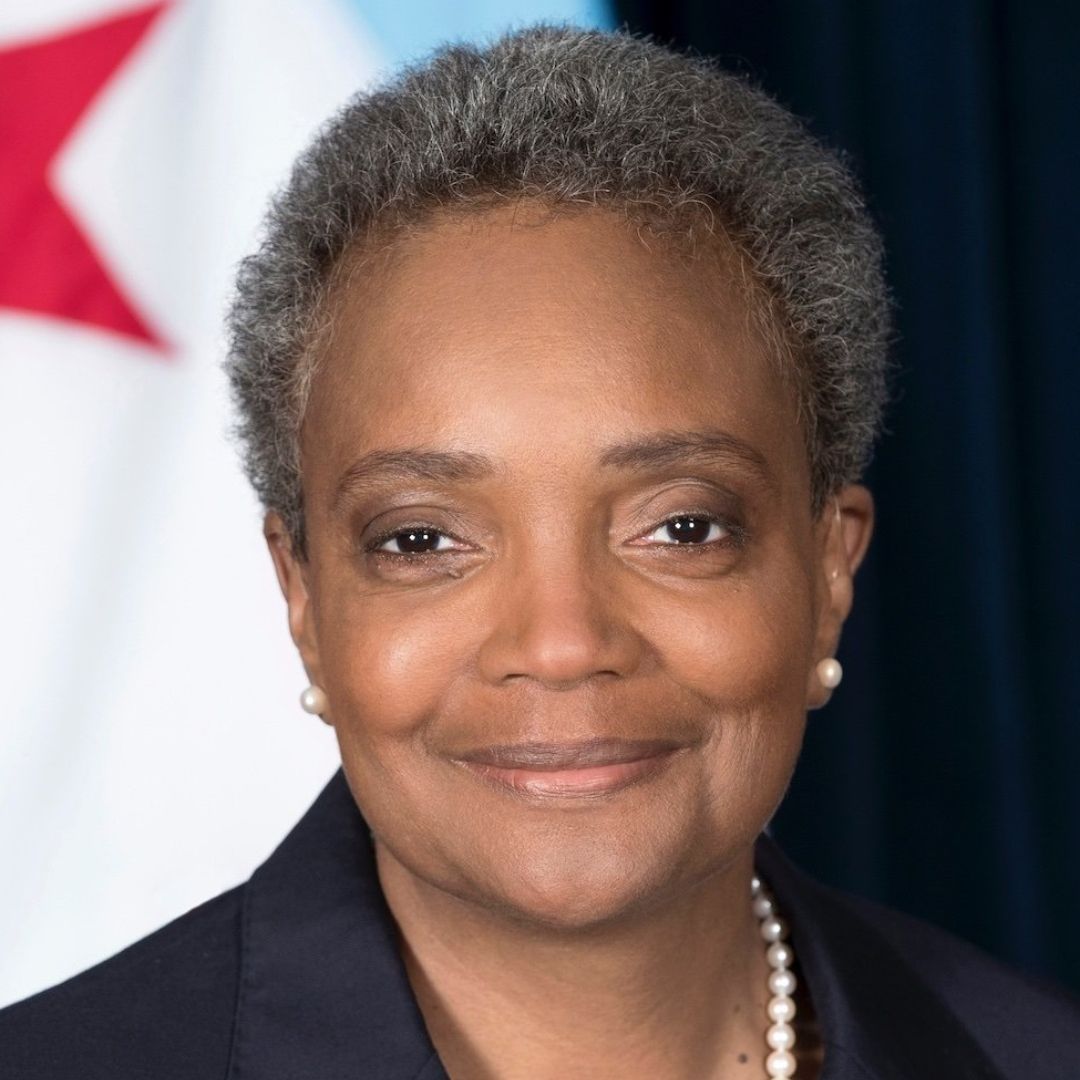Mayor Lori E. Lightfoot and the Chicago Department of Business Affairs and Consumer Protection (BACP) announced the annual scheduled increase in Chicago’s minimum wage and a scheduled enhancement of the Fair Workweek ordinance requirements.
Every July 1, Chicago’s minimum wage increases per the Minimum Wage Ordinance. The Chicago minimum wage is tiered for large businesses with 21 or more employees, and small businesses with 4-20 employees. The minimum wage for larger employees increases annually according to the Consumer Price Index or 2.5%, whichever is lower, since reaching $15 per hour in 2021. The minimum wage for small businesses continues to increase towards $15 per hour by 2023. The minimum wage as of July 1, 2022 will be:
$15.40 for employers with 21 or more employees (including all domestic workers, regardless of the number employed)
$14.50 for employers with 4-20 employees
The minimum wage for tipped employees will be $9.24 for employers with 21 or more employees, and $8.70 for employers with 4-20 employees (employers must make up the difference between any tips received and the applicable minimum wage for non-tipped workers.)

On July 1, 2022, scheduled enhancements to the Fair Workweek Ordinance will require employers in covered industries to post work schedules with at least 14 days’ notice, an increase from the previous 10 days’ notice. In another change, employees will need to earn less than $29.35 per hour or $56,381.85 per year to gain protection under the Fair Workweek Ordinance. Covered industries include building services, healthcare, hotel, manufacturing, restaurant, retail, or warehouse services.
Chicago has been a leader in worker protections, and the upcoming changes reflect the City’s commitment to creating financial opportunity for all Chicagoans.
“Chicago has a long, proud history of being allied with workers, both promoting and protecting their rights,” said Mayor Lightfoot. “Raising the minimum wage to $15.40 and requiring employers to post schedules 14 days in advance not only protects the rights of workers but creates better economic opportunity for all residents. With these new measures, the City is reaffirming its commitment to our talented workers and demonstrating why we are one of the nation’s leaders in protecting workers’ rights.”
Chicago’s minimum wage increases each July 1st. Employers that maintain a business facility within the City of Chicago or are required to obtain a business license to operate in the City are required to pay their employees at least the Chicago minimum wage. Additionally, any employee that works two hours or more in the City within a two-week period must also receive at least the Chicago minimum wage.
The Chicago minimum wage also applies to Subsidized Temporary Youth Employment Programs like those catering to Chicago’s youth looking for summer employment opportunities. Anyone age 24 or younger employed by, or engaged in employment coordinated by a nonprofit organization or government agency will see a minimum wage increase to $12.00 on July 1, 2022. Eligible youth can find qualifying opportunities by downloading the My CHI. My Future. (MCMF) mobile app, which is a resource designed to help teens and young adults easily find out-of-school programs, events, resources, jobs, and more.
“The minimum wage increase provides a multitude of benefits, from a better livelihood for workers to enhanced stability for employers when it comes to recruitment and retention,” said Kenneth J. Meyer, BACP Commissioner. “We must continue to invest in Chicago’s workforce, and these scheduled updates to the Chicago minimum wage and fair workweek ordinance will continue to enhance the vibrancy and equity of our local economy.”
“Chicago’s new minimum wage and fair workweek changes will have a significant impact on Chicago workers and their families as we focus on a prosperous economic recovery,” said Susan Sadlowski Garza, 10th Ward Alderwoman and Chairwoman of the Committee on Workforce Development. “In today’s competitive labor market, Chicago has proven itself as a worker-friendly city. In partnership with Mayor Lightfoot, we are continuing our commitment to provide working families sustainable wages and work schedule certainty.”
“Faced with the challenges of providing for families, paying rent, buying groceries and fighting the rising costs of gasoline, low wage workers are able to earn a living wage with the increases to the Chicago minimum wage and the lengthening of the Fair Workweek notice requirement this year,” said Andy Fox, Director of the Office of Labor Standards.
“Raising the minimum wage has lifted up thousands of workers throughout Chicago, and especially during these times of inflation and uncertainty, every cent counts,” said Bob Reiter, President of the Chicago Federation of Labor. “In raising the minimum wage, the city continues to be a leader in advocating for equitable job opportunities to lift up residents in all of Chicago’s 77 neighborhoods.”
BACP will host free informational webinars to prepare employers for the upcoming changes to Chicago’s Labor Standards Laws. The webinar, “Employer Responsibilities Under Chicago’s Minimum Wage Ordinance,” will take place Tuesday, June 7, at 2:00 p.m. Additionally, the webinar, “Employer Responsibilities Under Chicago’s Fair Workweek Ordinance,” will take place Thursday, June 9, at 2:00 p.m. To register for the webinars, visit Chicago.gov/BusinessEducation.
The BACP OLS webpage offers informational materials on Chicago’s Labor Standards Laws. Chicago businesses are required to post the Minimum Wage Notice and Fair Workweek Notice at their business. The notices will be available to workers and business owners in English, Spanish, Polish, Simplified Chinese, Tagalog, and Korean by July 1, 2022. Employers that violate the minimum wage ordinance can be fined $500 to $1,000 per day for each offense.
All Chicago worker protections are enforced by the BACP Office of Labor Standards (OLS). The OLS is dedicated to promoting and enforcing Chicago’s labor laws, including Minimum Wage, Paid Sick Leave, Fair Workweek, and Wage Theft Ordinance. In 2021, after receiving 93 complaints regarding the minimum wage and paid sick leave violations, the OLS secured over $1,000,000 in restitution for Chicago’s workers, as well as $236,595 in fines to the City. To file a labor standards complaint, workers can use the CHI 311 system (call 3-1-1, use the CHI311 mobile app, or visit 311.chicago.gov) or complete a Complaint Form.

The upcoming minimum wage increase and fair workweek changes align with Mayor Lightfoot’s Anti-Poverty Agenda — which includes growing quality jobs, improving people’s income, building wealth, and closing racial health disparities. Mayor Lightfoot has worked tirelessly to ensure that Chicago’s workers, especially the most vulnerable, are protected under Chicago’s labor laws. To learn about Chicago’s labor laws, visit Chicago.gov/LaborStandards.






